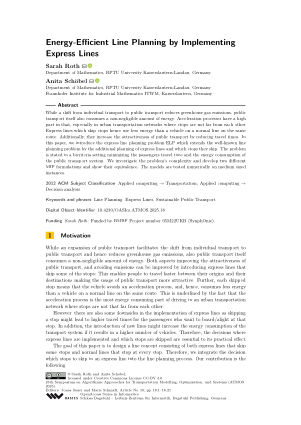Energy-Efficient Line Planning by Implementing Express Lines
Authors
Sarah Roth  ,
Anita Schöbel
,
Anita Schöbel 
-
Part of:
Volume:
25th Symposium on Algorithmic Approaches for Transportation Modelling, Optimization, and Systems (ATMOS 2025)
Part of: Series: Open Access Series in Informatics (OASIcs)
Part of: Conference: Symposium on Algorithmic Approaches for Transportation Modelling, Optimization, and Systems (ATMOS) - License:
 Creative Commons Attribution 4.0 International license
Creative Commons Attribution 4.0 International license
- Publication Date: 2025-10-17
File

PDF
OASIcs.ATMOS.2025.18.pdf
- Filesize: 2.06 MB
- 21 pages
Document Identifiers
Subject Classification
ACM Subject Classification
- Applied computing → Transportation
- Applied computing → Decision analysis
Keywords
- Line Planning
- Express Lines
- Sustainable Public Transport
Metrics
- Access Statistics
-
Total Accesses (updated on a weekly basis)
0PDF Downloads0Metadata Views
Abstract
While a shift from individual transport to public transport reduces greenhouse gas emissions, public transport itself also consumes a non-negligible amount of energy. Acceleration processes have a high part in that, especially in urban transportation networks where stops are not far from each other. Express lines which skip stops hence use less energy than a vehicle on a normal line on the same route. Additionally, they increase the attractiveness of public transport by reducing travel times. In this paper, we introduce the express line planning problem ELP which extends the well-known line planning problem by the additional planning of express lines and which stops they skip. The problem is stated in a bicriteria setting minimizing the passengers travel time and the energy consumption of the public transport system. We investigate the problem’s complexity and develop two different MIP formulations and show their equivalence. The models are tested numerically on medium sized instances.
Cite As Get BibTex
Sarah Roth and Anita Schöbel. Energy-Efficient Line Planning by Implementing Express Lines. In 25th Symposium on Algorithmic Approaches for Transportation Modelling, Optimization, and Systems (ATMOS 2025). Open Access Series in Informatics (OASIcs), Volume 137, pp. 18:1-18:21, Schloss Dagstuhl – Leibniz-Zentrum für Informatik (2025)
https://doi.org/10.4230/OASIcs.ATMOS.2025.18
BibTex
@InProceedings{roth_et_al:OASIcs.ATMOS.2025.18,
author = {Roth, Sarah and Sch\"{o}bel, Anita},
title = {{Energy-Efficient Line Planning by Implementing Express Lines}},
booktitle = {25th Symposium on Algorithmic Approaches for Transportation Modelling, Optimization, and Systems (ATMOS 2025)},
pages = {18:1--18:21},
series = {Open Access Series in Informatics (OASIcs)},
ISBN = {978-3-95977-404-8},
ISSN = {2190-6807},
year = {2025},
volume = {137},
editor = {Sauer, Jonas and Schmidt, Marie},
publisher = {Schloss Dagstuhl -- Leibniz-Zentrum f{\"u}r Informatik},
address = {Dagstuhl, Germany},
URL = {https://drops.dagstuhl.de/entities/document/10.4230/OASIcs.ATMOS.2025.18},
URN = {urn:nbn:de:0030-drops-247746},
doi = {10.4230/OASIcs.ATMOS.2025.18},
annote = {Keywords: Line Planning, Express Lines, Sustainable Public Transport}
}
Author Details
Funding
- Roth, Sarah: Funded by BMBF Project number 05M22UKB (SynphOnie).
References
- Javier Durán-Micco and Pieter Vansteenwegen. A survey on the transit network design and frequency setting problem. Public Transport, 14(1):155-190, 2022. URL: https://doi.org/10.1007/S12469-021-00284-Y.
-
Marc Gallet, Tobias Massier, and Thomas Hamacher. Estimation of the energy demand of electric buses based on real-world data for large-scale public transport networks. Applied energy, 230:344-356, 2018.

- Yuan Gao, Lixing Yang, and Ziyou Gao. Energy consumption and travel time analysis for metro lines with express/local mode. Transportation Research Part D: Transport and Environment, 60:7-27, May 2018. URL: https://doi.org/10.1016/j.trd.2016.10.009.
-
R. Hoogervorst, E. van der Hurk, P. Schiewe, A. Schöbel, and R. Urban. The bus rapid transit investment problem. Computers and Operations Reserach, 167(106640), 2024.

- Zhujun Li, Baohua Mao, Yun Bai, and Yao Chen. Integrated optimization of train stop planning and scheduling on metro lines with express/local mode. IEEE Access, 2019. URL: https://doi.org/10.1109/ACCESS.2019.2921758.
- Qin Luo, Yufei Hou, Wei Li, and Xiongfei Zhang. Stop plan of express and local train for regional rail transit line. Journal of Advanced Transportation, 2018. URL: https://doi.org/10.1155/2018/3179321.
- Bum Hwan Park, Yong-Il Seo, Sung-Pil Hong, and Hag-Lae Rho. Column generation approach to line planning with various halting patterns - application to the korean high-speed railway. Asia-Pacific Journal of Operational Research, 30(04):1350006, 2013. URL: https://doi.org/10.1142/S0217595913500061.
- P. Schiewe. Integrated Optimization in Public Transport Planning, volume 160 of Optimization and Its Applications. Springer, 2020. URL: https://doi.org/10.1007/978-3-030-46270-3.
- Philine Schiewe, Anita Schöbel, Sven Jäger, Sebastian Albert, Christine Biedinger, Thorsten Dahlheimer, Vera Grafe, Olli Herrala, Klara Hoffmann, Sarah Roth, Alexander Schiewe, Moritz Stinzendörfer, and Reena Urban. Documentation for lintim 2024.12, 2024. URL: https://nbn-resolving.de/urn:nbn:de:hbz:386-kluedo-85839.
-
M. Schmidt and A. Schöbel. Modeling and optimizing transit lines. In S. Parragh and T.V. Woensel, editors, Handbook on Transport Modeling, Research Handbooks in Transportation Studies, chapter 16. Edward Elgar Publishing, 2025.

- A. Schöbel. Line planning in public transportation: models and methods. OR Spectrum, 34(3):491-510, 2012. URL: https://doi.org/10.1007/S00291-011-0251-6.
- Anita Schöbel and Susanne Scholl. Line Planning with Minimal Traveling Time. In Leo G. Kroon and Rolf H. Möhring, editors, 5th Workshop on Algorithmic Methods and Models for Optimization of Railways (ATMOS'05), volume 2 of Open Access Series in Informatics (OASIcs), pages 1-16. Schloss Dagstuhl - Leibniz-Zentrum für Informatik, 2006. URL: https://doi.org/10.4230/OASIcs.ATMOS.2005.660.
- Lianhua Tang, Andrea D'Ariano, Xingfang Xu, Yantong Li, Xiaobing Ding, and Marcella Samà. Scheduling local and express trains in suburban rail transit lines: Mixed-integer nonlinear programming and adaptive genetic algorithm. Computers & Operations Research, 135:105436, November 2021. URL: https://doi.org/10.1016/j.cor.2021.105436.
- Jia Xie, Jie Zhang, KeYang Sun, ShaoQuan Ni, and DingJun Chen. Passenger and energy-saving oriented train timetable and stop plan synchronization optimization model. Transportation Research Part D: Transport and Environment, 98:102975, September 2021. URL: https://doi.org/10.1016/j.trd.2021.102975.
- Anan Yang, Bo Wang, Jianling Huang, and Chen Li. Service replanning in urban rail transit networks: Cross-line express trains for reducing the number of passenger transfers and travel time. Transportation Research Part C: Emerging Technologies, 115:102629, June 2020. URL: https://doi.org/10.1016/j.trc.2020.102629.
